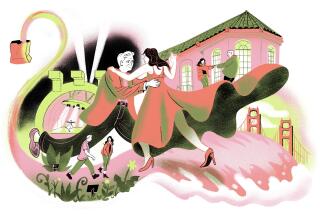Hollywood Affair of the Heart
- Share via
Years ago, Katharine Hepburn, who died Sunday at 96, was vacationing with Spencer Tracy in the South of France. Hepburn, noting the blue sky and the blue sea as the couple lolled in the villa’s swimming pool, said, “Oh, Spencer, isn’t it heavenly!”
“Yeah,” said Tracy in that familiar gruff voice, “and it’s not a bit better than what we deserve.”
For the record:
12:00 a.m. July 4, 2003 For The Record
Los Angeles Times Friday July 04, 2003 Home Edition Main News Part A Page 2 National Desk 1 inches; 53 words Type of Material: Correction
Katharine Hepburn -- The appreciation of Katharine Hepburn in Monday’s Section A described as legend the comment Spencer Tracy made about the actress after their first meeting (“Not much meat there, but what’s there is choice”). That comment actually comes from one of the movies in which they both appeared, “Pat and Mike.”
It was a delightful exchange, and somehow it captured the spirit of the two people and their long relationship -- Hepburn’s ebullient enthusiasm, Tracy’s earthy realism. Their love affair had been going on for more than a quarter of a century and yet the press, especially the often-notorious Hollywood press, seemed to look the other way. Kate and Spence rarely if ever made the columns. Somehow it was as if the Hollywood press corps responded to the dignity with which the couple conducted their lives and their relationship.
After Tracy died in 1967 following a last painful battle with congestive heart failure, I wrote a column about his expressing the hope that “Guess Who’s Coming to Dinner,” which they had just completed, would be a fitting memento of their dignified association. I had a handwritten note from Katharine Hepburn thanking me for using the word “dignified.” She added, “I have spent twenty-five years learning to be invisible in all the proper places.” It was a moving and revealing statement by a proud and independent woman.
When Tracy, already troubled by a weakened heart, went to Berlin to shoot Stanley Kramer’s “Judgment at Nuremberg,” Hepburn went along as nursemaid. A friend who worked for Kramer said that, during the shooting, the limo would pick up Kramer and Tracy in front of the hotel every morning, then drive around to the service entrance at the rear. Hepburn would dash into the limo and they would all drive off to the location. At the end of the day, the limo would stop at the service entrance and Hepburn would dash into the hotel; the limo would proceed to the front entrance and Kramer and Tracy would emerge.
I’m not at all sure that this charade fooled the indefatigable fans who were waiting for every glimpse of the stars, but it symbolized Hepburn’s efforts to remain invisible.
There are many legends about Hepburn and Tracy, including the story of their first meeting on the lot at MGM. A mutual friend introduced them; Tracy allegedly looked at Hepburn and said, “Not much meat, but what’s there is choice.” What did become known around Hollywood was that the relationship, powerful as it was, was not idyllic. Tracy was a complicated man bearing large emotional burdens and he sometimes went off on drinking binges. Hepburn would often have to go and retrieve him from the saloons he frequented.
As the years went on, Tracy’s health began to fail. When it came time to shoot “Guess Who’s Coming to Dinner,” Tracy was uninsurable. Both Hepburn and Kramer pledged their entire salaries against the possibility that Tracy might not be able to finish the film.
During the shooting, Hepburn sent a message, urging me to come by and watch Tracy work, because she thought he was giving such a magnificent performance.
On a hot June morning in 1967 I went to the Columbia Studios on Gower Street. Hepburn’s secretary came to meet me and explained that the shooting schedule had been changed so that Tracy was about to do the film’s climactic scene.
Obviously, the hope was to get on film Tracy’s important scene while his health still held up. I started to leave but, at Hepburn’s insistence, I stayed -- in the wings so that Tracy wouldn’t be distracted by my presence.
The scene was the moment when Tracy speaks to the two assembled families: Sidney Poitier and his parents and Hepburn and the daughter Poitier hopes to marry.
“If you two love each other as much as her mother and I have loved each other,” Tracy said, they would be able to handle the difficulties of an interracial marriage.
For a long moment nobody could speak. It was profoundly moving because it seemed so clear to everyone on the soundstage that he was speaking of his love for Hepburn. It is still impossible to watch the scene without feeling a strong emotional tug.
When Kramer quietly said “Cut,” Tracy went over, put his arm around him and said, “OK, Stanley, you’ve got it.” Tracy died a few weeks later.
Until then, Hepburn never spoke of him except as the man she regarded as the finest actor in the movies. And after his death she still spoke of him in that sort of arm’s length way. It was only after Tracy’s widow died that Hepburn spoke more openly of their deeper feelings and long time together.
According to a friend of mine who knew them well, Tracy died at Hepburn’s home after a last, excruciatingly painful heart attack. As the attendants loaded Tracy into the ambulance, Hepburn sat beside him and said, “Let go, Spencer, it’s over.”
There have been Hollywood romances conducted in public for as long as they lasted, but not, I think, has there been anything to equal the passion and the perseverance and, indeed, the dignity of Katharine Hepburn’s love for Spencer Tracy.
Charles Champlin is a former film critic, arts editor and critic at large for The Times.
More to Read
Only good movies
Get the Indie Focus newsletter, Mark Olsen's weekly guide to the world of cinema.
You may occasionally receive promotional content from the Los Angeles Times.









